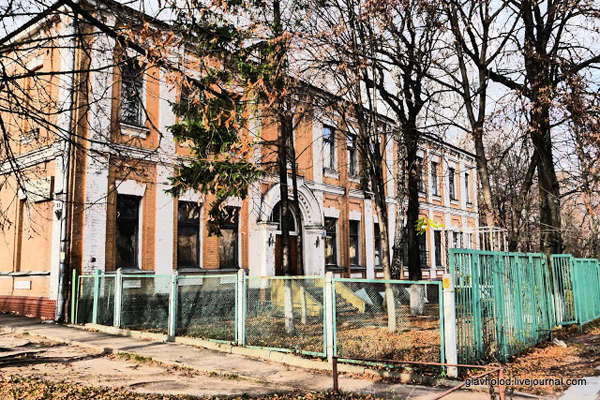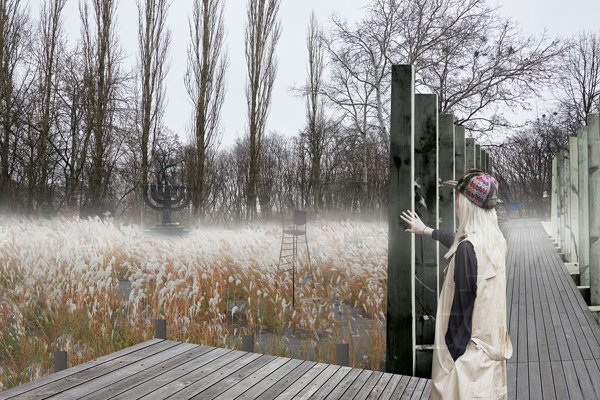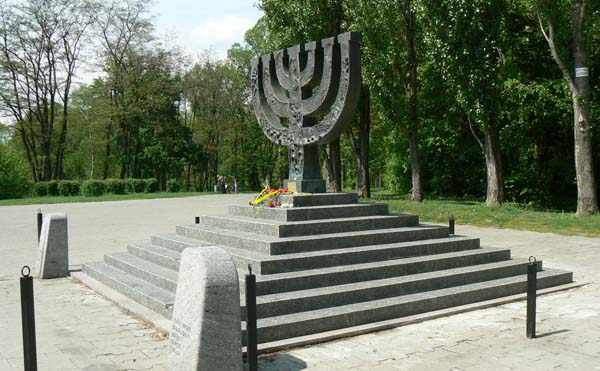The massacre committed by the Nazis and local collaborators in the Babi Yar ravine on 29 September 1941, just 10 days after Kyiv was occupied during World War II, was the largest Holocaust mass execution “from bullets” in the Soviet Union. The victims included the patients of the psychiatric hospital, the Romani, Jews, Ukrainian nationalists, and other groups. During the first days, over 34,000 Kyivan Jews were brutally murdered in a ravine on the outskirts of the city. The executions continued until the city was liberated from Nazis. Altogether, 120,000 people were executed in a ravine which is now hidden under a street and a park which was literally built on bones.
1.5 mn Jews were killed on the territory of Ukraine during World War II, with most being shot in mass executions outdoors, like in Babi Yar. During the Soviet times that followed, the reality of the Holocaust was swept under the rug, as Jews were branded as anti-Soviet “cosmopolites.” To this day, the Holocaust and Babi Yar remain “undigested history” in Ukraine. Although discussions about creating a Holocaust memorial intensified after the Euromaidan revolution in 2014, the creation of a proper memorial is still far away. And the partial reason for this, according to Josef Zissels, co-President of the Ukrainian Vaad, or Association of Jewish Organizations and Communities of Ukraine, is a memorial project backed by Russian oligarchs which aims to discredit Ukraine in what he calls a “hybrid war” fashion.
Zissel’s full appeal in English was published on his facebook page. He writes that there are currently three Holocaust memorial projects for Babi Yar.
1. A state project run by the Culture Ministry of Ukraine which involves creating a memorial museum in honor of Babi Yar victims at the former office of the Jewish cemetery located at vul. Melnikova 44.

This decision was made in 2016 with the participation of Vaad and the International Babyn Yar Memorial Foundation chaired by Andriy Adamovskyi, but is moving slowly, partially because its management is being done not directly but through the Babi Yar National Historical Memorial Reserve. This project’s concept was developed by a group of historians from the Institute of History of the National Academy of Sciences of Ukraine. The narrative of the project was published at the website of the Institute and awaits translation into English in order to be reviewed by international scholars – a step which has currently come to a standstill because the Reserve is doing its best to sign no agreements with the Institute. An organizing committee for Babi Yar which Zissels is part of, has suggested to the group of historians to develop a general concept – not only of the Babi Yar Museum, but make the whole Babi Yar territory, which spans over 170 acres.
So, this project, developed by Ukrainian historians and run by the Ministry of Culture, is stagnating due to red tape from the state institutions.
2. Project 2, a memorial park, was initiated by the Babi Yar Public Committee (Vitaliy Nakhmanovych and the Vaad of Ukraine (Josef Zissels) and is being implemented by the Ukrainian Jewish Encounter group (UJE) headed by James Temerty (Canada).

This landscape and architectural project proposes creating a huge memorial park (over 170 acres), including Babi Yar and all the adjoining cemeteries. It goes back to 2006-2007, when the Babi Yar Public Committee developed and published a scientific concept of creating a Babi Yar Reserve, and Vaad helped organize a decree signed by President Viktor Yushchenko to create such a reserve. In 2016, a competition took place for the best ideas of a landscape and architectural park, sponsored by the UJE. No one won the first place but places second through seventh presented the best landscape ideas. Zissels believes that it’s time to move forward with this idea and determine which of the best three ideas deserve a full ad hoc design.
However, the project is stalling because neither the city nor state authorities have officially responded to the proposal to implement it. UJE is willing to make a major investment but can’t be the sole sponsor of the project.
3. Project 3, of a Babi Yar Memorial and Holocaust Museum, is the most controversial one, according to Zissels – and, judging by its site, the most PR-savvy. The idea originated in 2016 from a group of major Russian businessmen of Jewish origin born in Ukraine, among them - Mikhail Fridman, German Khan, and Pavel Fuks. Later, the group found other supporters in Ukraine – famous pop singer Sviatoslav Vakarchuk, Ukrainian oligarch Viktor Pinchuk, Natan Sharansky, Yaakov Don and others. Zissels says they are “non-executive figureheads,” as the financial support – $100 mn - comes from the Russian financial Alfa-Group Holding and therefore – of Russia and her leaders.
The main problem with the project, Josef Zissels says, lies in its concept which was developed in Russia:
“We must understand why the Russian oligarchs who cannot make a step without the permission of Russian President Putin are promising to invest $100 mn into a project in the territory of Ukraine, against which Russia has been waging aggressive war for the fifth year now. No projects like this can exist without Putin’s interest in them. And even though this question is mostly rhetorical, I believe we must get a clear answer to it. Why do the Russian authorities allow Russian oligarchs under their control to spend significant sums of money on Ukraine? These are the oligarchs who earn their money in Russia, who fund many projects including military ones in Russia, and then these military projects get ‘implemented’ in our Donbas and Crimea by annexing part of the Ukrainian territory and killing Ukrainian citizens.“
Only 12-15% of this concept, developed by foreign historians, was made available to the public and was criticized by Ukrainian historians and representatives of the public, who discussed it in the Taras Shevchenko Kyiv National University on 7-8 February 2018. The criticism can be read online in an Open letter of Ukrainian historians.
While supporting the idea of building a Memorial with a museum, research, and educational component, they believe:
- that it’s impossible to build a memorial center at the place of the massacre itself, or on one of the former cemeteries, as it is planned in the project;
- that a separation of the so-called “Holocaust from bullets” from the entire history of the Holocaust in Europe is artificial, and will attempt to resurrect a single Soviet civilization space at the level of historical memory, serving the neoimperialist ideas of the “Russian world”;
- that the museum should be dedicated to the entire history of the Holocaust - as Ukrainian lands during WWII were occupied by different states and Jews were exterminated in different ways (up to 25% of the murdered Ukrainian Jews were killed in the Nazi death camps in occupied Poland);
- that, although the Jewish tragedy made Babi Yar into a global symbol of the Holocaust, and over 2/3 of the overall number of victims shot and buried at this place were Jews (90,000-100,000), it also became a place of execution of others who Nazis considered their enemies: the Roma, Ukrainian nationalists, Soviet POWs and partisans, prisoners of the Syrets concentration camp, hostages, and the mentally ill. As well, after WWII, Babi Yar was the epicenter of a technogenic catastrophe. Thus, associating Babi Yar only with the Holocaust, ignoring its other victims and other dramatic moments of history, will only exacerbate the battle of memories which is going on here for a long time. Therefore, though the destruction of the Jews of Kyiv must be the central theme of the Museum of Babi Yar, the museum of the Holocaust and museum of Babi Yar must be two different institutions which reveal different aspects and different contexts of the tragic history of the XX century.

According to Zissels, the narrative creates a distorted picture of the Holocaust in Europe.
"It places Babi Yar and Kyiv in the center of it. What does this mean? Ukraine was not even a state at the time, how could it be the center of the Holocaust? Wasn’t it Nazi Germany which exterminated Jewish people in the territory of Ukraine, Poland and other countries? Many participants in the discussion noted and criticized this shifting of accents. But no reaction came from the concept group.
Furthermore, how can one create a narrative of the Holocaust, especially of the Holocaust in Ukraine, without examining the past twenty years of its history – its Bolshevik occupation, the forced coming of Communists to power, the cruel policies of the Soviets, massive repressions that affected all the strata of the society, and as a result – a change in the Ukrainian social identity. This is not a scientifically argued position, but an approach deliberately aimed at distorting the meaning of the past.
All the Holocaust museums in the world always start with history preceding the tragic period. It is especially important for the understanding of the Holocaust in general and of Holocaust peculiarities of this country, in particular. The submitted project totally ignores the preceding Soviet period. It ignores severe repressions that taught people to ignore massive killings, encouraged informing on one another, brought full demoralization of the population under the repressions, the Holodomor and other crimes of the Soviet power. How can all of this be ignored?[…]
We suspect, and not without good ground, that this project is meeting some important political goals of today’s Russia in her real war on Ukraine and in the information war and the distortion of the image of Ukraine that Russia is trying to impose on the whole world. This goal is to present Ukraine as a fascist, anti-Semitic and nationalistic state where human rights used to and continue to be violated. And the museum – in the form that it is presented today – will serve this purpose.
So, is this project in the interests of Ukraine? Certainly not. […]I want to state clearly and openly that we do not oppose the project itself. The pro-Ukrainian part of the Jewish community, in particular, the Vaad of Ukraine, the most active part of the Jewish community in Ukraine, does not oppose the creation of a memorial and a museum – it’s high time to create them. But the way the Russian project suggests it, it will work against Ukraine rather than for her benefit. Unfortunately, I have to state that the 'hybrid war' has come to the 'Jewish street' now, just as it had come to the Ukrainian society at large."
The project is being powerfully promoted. Its participants are travelling around the world advertising their future creation, claiming to have the full support of the Ukrainian authorities, Zissels states. However, they leave out the fact that President Poroshenko, when attending the presentation of the project on 29 September 2016, had said he would like to create a Ukrainian project of the Holocaust Memorial. As well, they stay silent about the criticism they are facing from Ukrainian civil society and researchers.
Zissels states that he does not want to fight with this team but to reach agreements on important principles – that the projects of the Memorial and the Holocaust Museum be Ukrainian projects:
“The state of Ukraine and the Ukrainian civil society must create these projects jointly rather than letting Russian oligarchs with a clear-cut political purposes to inflict damage on the reputation of Ukraine.”
Read also:
- Kyiv honors memory of 34,000 killed in first days of Holocaust in Babi Yar
- Nazi dreams of an enslaved Ukraine: the blind spot of Germany’s historical memory – Timothy Snyder
- Understanding the Ukrainians in WWII Part 3. Of German plans and German collaborators
- Ukraine remembers the “forgotten” Holocaust victims
- Top-6 Soviet World War II myths used by Russia today

